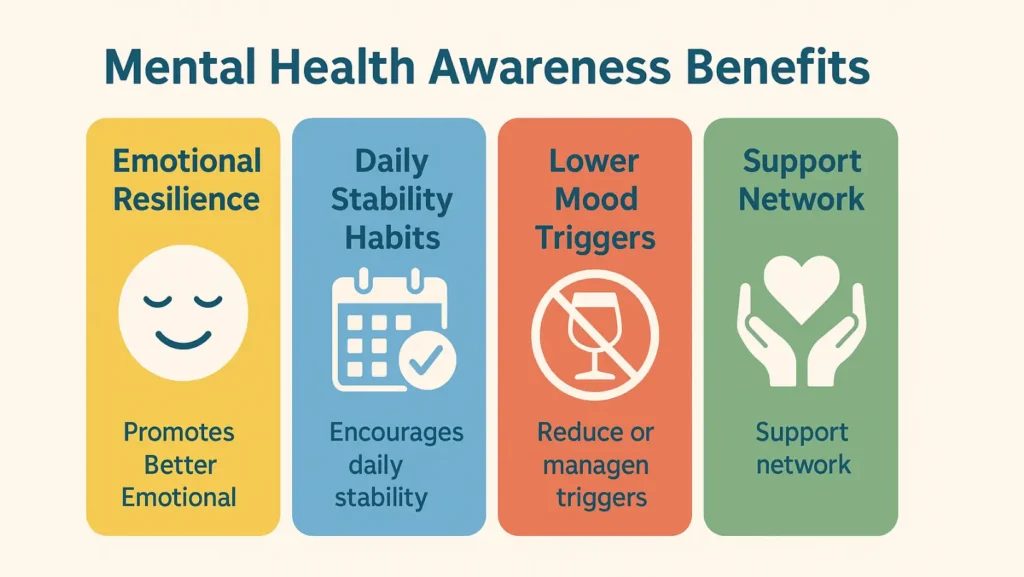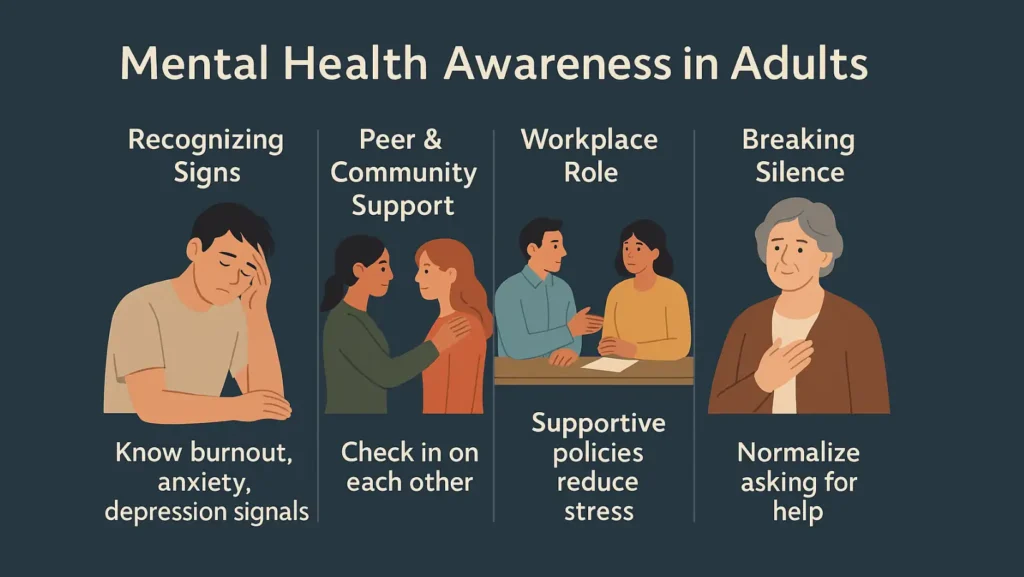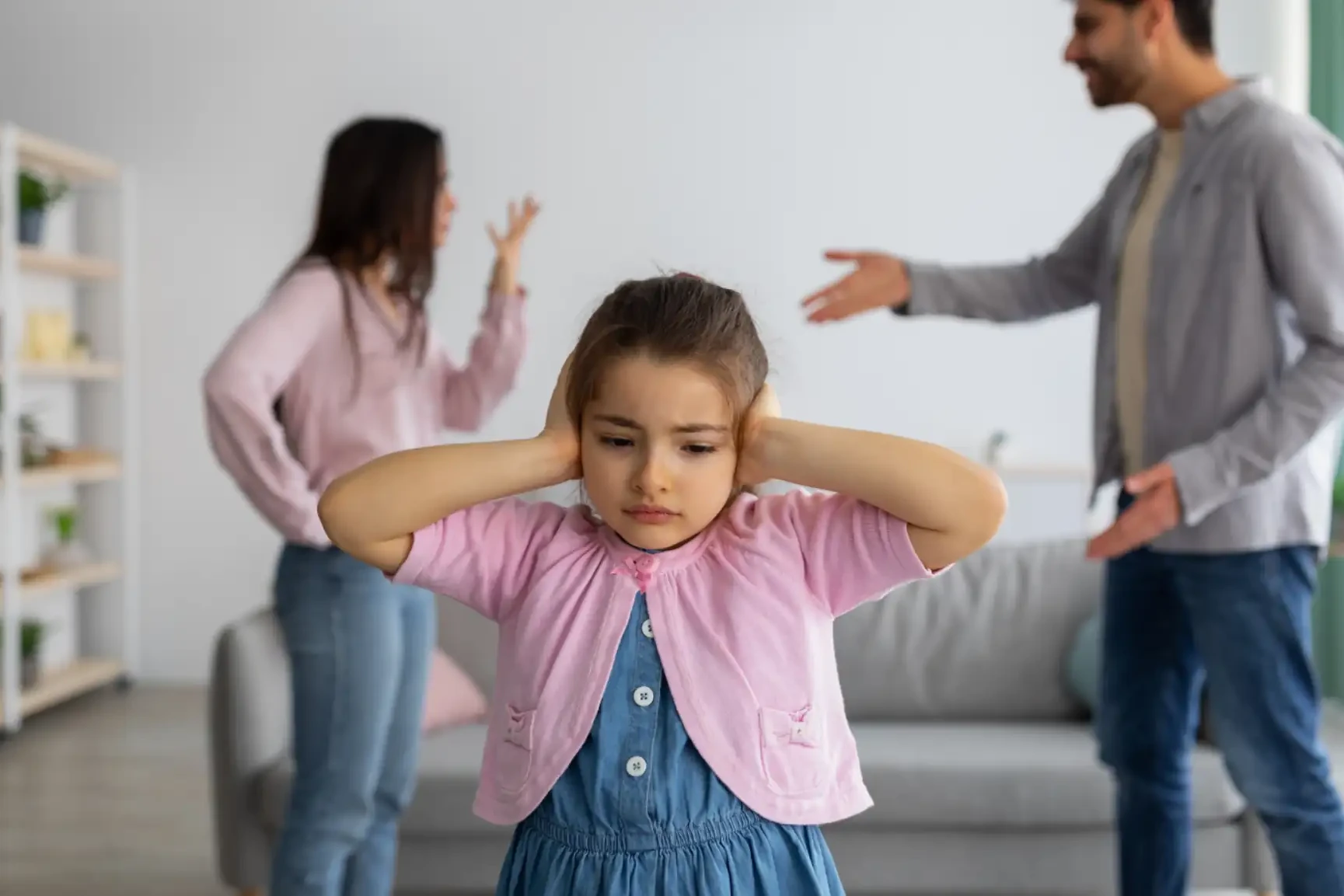The importance of mental health awareness starts with a simple fact. Your mind health shapes how you think, feel, and act each day. When you understand it, you spot warning signs early. You know where to get help. You support people you love. You also build a safer home, school, and workplace.
Table of Contents
ToggleWhat Is Mental Health Awareness?
Mental health awareness means you learn how feelings and thoughts work. You learn common signs of stress, anxiety, and low mood. You learn steps that help. You learn when to call a counselor or a doctor. This knowledge turns fear into action. It also shows the importance of mental health awareness in real life, not just in talk.
Definition And Role In Emotional Well-Being
Your emotional well-being is your daily balance. It is how you handle stress, relate to others, and make choices. Awareness gives you words for what you feel. It gives you tools you can use right away.
Examples:
- Label the feeling. “I feel worried,” or “I feel down.”
- Take a small step. Breathe slow for two minutes. Step outside for light. Drink water.
- Share with one trusted person. Keep it short and honest.
- Note a next step. Book a visit or call a helpline if signs persist.
These simple moves protect your mood and keep you steady. They highlight the importance of mental health awareness for daily stability.
Difference Between Mental Health And Mental Illness
Mental health is your current state. It changes with sleep, stress, food, and support. Mental illness is a set of lasting signs that cause suffering and loss of function. You can live with a condition and still have good days with care. You can have no diagnosis and still need support during a hard season.
Knowing this difference cuts shame. It opens the door to help. It also shows why mental health awareness matters for everyone, not just for people with a diagnosis.
How Awareness Campaigns Change Public Perception
Clear facts and real stories shift views. Campaigns share warning signs. They list helplines and low-cost clinics. They show that recovery is possible. When you see people you trust speak up, you feel safer speaking up too. This shift is the importance of mental health awareness at scale. It moves a whole community toward care and away from silence.
Why Mental Health Awareness Matters
You do not need a crisis to care about this topic. You need a plan. A plan built on facts saves time, money, and lives. That is why mental health awareness matters.
Reduces Stigma And Normalizes Seeking Help
Shame stops people from getting help. Awareness breaks shame. When leaders, parents, and teachers use plain, kind language, you see help as normal. You see counseling like dental care. You also learn how to support a friend without judging them. This is a core mental health awareness benefit that helps everyone.
Encourages Early Intervention And Treatment
Problems grow when you ignore them. Early action keeps them small. If anxiety is rising, small steps like sleep care, movement, and brief therapy can turn the tide. If low mood is heavy, a quick check with a clinician can prevent a crash. This is the importance of mental health awareness in action. You learn to move before things get worse.
Improves Quality Of Life For Individuals And Families
When one person struggles, the whole home feels it. Meals shift. Sleep gets messy. Plans fall apart. Awareness gives your family a shared playbook:
- Use simple, non-blaming words.
- Set small, safe routines for meals, sleep, and fresh air.
- Keep crisis numbers on the fridge and in phones.
- Share tasks so no one carries the full load.
Strengthens Community Support Systems
Communities grow stronger when support is easy to find. Clear signs in clinics. School programs that teach feelings and coping. Workplaces that train managers to respond with care. These parts connect like a chain. You get help faster, with less confusion. This shows the importance of mental health awareness far beyond the doctor’s office.
Mental Health Awareness Benefits
When you build awareness, you get real gains you can measure. These mental health awareness benefits reach you, your family, and your workplace.
Promotes Better Emotional Resilience
Resilience means you bounce back after stress. Awareness builds it in small, steady ways:
- Sleep at regular times.
- Move your body each day, even a short walk.
- Eat on schedule to avoid crashes.
- Limit alcohol and drugs that worsen mood.
- Keep a short list of people you can call.
These skills reduce the impact of hard days. They prove why mental health awareness matters for everyday life.
Encourages Open Conversations At Home And Workplace
Silence feeds fear. Simple words help:
- “I am having a tough day today.”
- “I could use a short break.”
- “Can we talk for ten minutes after lunch?”
When talk becomes normal, help becomes normal. This is one of the most practical mental health awareness benefits you can build fast.
Boosts Productivity And Academic Performance
Mind health drives focus and memory. When support is in place, you make fewer errors at work. You miss fewer classes. You finish tasks on time. That is not luck. It is the importance of mental health awareness turning into better performance.
Improves Access To Therapy And Counseling Services
Awareness points you to clear options. You learn about telehealth. You learn about school or workplace programs. You learn about sliding-scale clinics. You learn what to expect in the first session. Clear info lowers fear and makes the first step much easier.
Raising Mental Health Awareness In Society
raising mental health awareness is a group task. Each sector plays a part. When you align these parts, progress speeds up.
Role Of Schools And Universities In Awareness Programs
Schools can teach mental health literacy the same way they teach reading. Practical ideas:
- Short lessons on feelings, stress signs, and safe coping.
- Peer support clubs with staff guidance.
- Clear posters with local helplines and clinic hours.
- Training for teachers to spot early warning signs.
These steps form a safety net. Students learn words, skills, and paths to care. That is a powerful mental health awareness benefit for the next generation.
How Media And Influencers Reduce Misinformation
Words shape action. Media can share data with context. Influencers can model help-seeking with honesty. They can link to crisis lines and avoid claims that are not backed by evidence. When public voices act with care, people copy their steps. That is why mental health awareness matters online.
Community Workshops And Advocacy Campaigns
Local events bring help close to home. A town library talk. A clinic Q and A. A neighborhood walk with a counselor. These efforts:
- Teach warning signs.
- Map out local services.
- Reduce fear of first visits.
- Gather feedback for leaders.
You see your neighbors care. You feel less alone. That changes behavior.
Using Digital Platforms For Mental Health Education
Simple tools work best. Short videos. One-page guides. Anonymous Q and A with licensed pros. Clear privacy notes. Support in local languages. When online info meets people where they are, raising mental health awareness grows quickly and safely.
Mental Health Awareness In Adults
Life gets busy. Work, bills, kids, and aging parents add pressure. mental health awareness in adults focuses on the signs you might ignore and the steps that help right away. It reminds you of the importance of mental health awareness at every stage of adult life.
Recognizing Signs Of Burnout, Anxiety, And Depression
Know the common signs so you can act fast.
- Burnout: deep tiredness, low joy at work, growing distance from tasks, more mistakes.
- Anxiety: constant worry, fast heart rate, tense muscles, poor sleep.
- Depression: sad or empty mood, loss of interest, slow energy, changes in sleep or appetite, thoughts of worthlessness.
If these signs last most days for two weeks, it is time to talk to a clinician. That step is normal. It is also smart.
Importance Of Peer Support And Workplace Empathy
Peers notice change first. A simple “How are you really doing” can open a door. Good teams set easy rules:
- No jokes about mental pain.
- Respect privacy.
- Offer concrete help like covering a short shift or joining a break.
- Share helplines and support links in team chats.
This culture change lowers risk and builds trust. It proves why mental health awareness matters more than any poster can.
How Employers Can Promote Mental Well-Being
Employers influence health every day through policy and tone. Strong actions include:
- Train all managers to respond to mental health concerns with care and speed.
- Offer employee assistance programs that are private and easy to reach.
- Provide flexible scheduling during hard periods when possible.
- Make workloads realistic and review them often.
- Allow mental health days and protect them from stigma.
These steps are not extras. They are core safety measures. They deliver clear mental health awareness benefits for staff and the business.
Breaking Generational Silence Around Mental Health
Many older adults were taught to keep feelings hidden. They may see help as weakness. You can break that silence with respect:
- Use plain words, not labels.
- Share one short story of help that worked for you or a friend.
- Offer to join them at a first visit.
- Keep it private. Do not argue. Invite, then give space.
Small, steady talks beat long debates. Over time, the wall softens. This is the quiet importance of mental health awareness inside families.
Early Intervention And Mental Health Awareness
When signs are noticed early, support can begin before a crisis grows. This is the center of mental health awareness early intervention. It connects your understanding with your response. It also strengthens the importance of mental health awareness in preventing long-term harm.
Why Early Detection Saves Lives
Certain signs show up before things get severe. These may include sleep changes, withdrawal from friends, or strong worry that does not calm down. When these signs appear, support at the early stage can reduce suffering. This helps a person feel seen and not alone. It also lowers the chance that symptoms will reach an emergency point. This is one of the strongest mental health awareness benefits when early steps are taken.
The Role Of Teachers, Parents, And Caregivers
Adults who spend time with children and teens notice behavior changes faster than anyone. If a child stops playing, loses interest in school, or expresses fear without clear reason, these signs matter. A caregiver does not need to solve everything. They only need to notice and guide. A small, direct question such as “Tell me what you feel right now” can help the child open up. This is the real action of mental health awareness early intervention in daily life.
Identifying Warning Signs In Children And Teens
Children often express emotional pain through behavior, not words. Examples:
- Sudden anger or frustration over small things.
- Trouble sleeping or eating.
- Wanting to be alone more than usual.
- Drop in school performance.
- Complaints of stomach or head pain without illness.
Teens may show risk through social withdrawal, sudden silence, or online posts hinting at sadness. When these patterns show, do not wait. This is where why mental health awareness matters becomes clear. Open talk and a counseling appointment can change the path ahead.
How Awareness Improves Long-Term Outcomes
When challenges are handled early, the brain learns healthier coping patterns. This reduces the chance of long-term mood disorders. It makes stress easier to handle later in life. This is a key mental health awareness benefit that supports future well-being.
Every early caring step counts. This is also another clear example of mental health awareness early intervention shaping a safer future.
Mental Health Awareness At Work And School
Both schools and workplaces are major parts of daily life. They need to be safe for emotional health. The importance of mental health awareness becomes stronger when these environments support the mind, not just performance.
Creating Mental Health Friendly Workplaces
A healthy workplace has clear expectations, fair workload, and respectful communication. Leaders can:
- Encourage breaks.
- Allow mental health days without shame.
- Give training on emotional first aid.
- Share support contacts privately and often.
These steps support mental health awareness in adults who may hide their stress due to role pressure.
Employee Assistance Programs And Safe Spaces
Employee support services should be simple to reach. Staff should know how to schedule sessions and what privacy rules protect them. A quiet space for short breaks or private calls also helps. When this is normal, people feel safe speaking up. This is another proof of why mental health awareness matters in the workplace.
Student Awareness Initiatives And Peer Groups
Schools can form peer support groups where students talk about feelings without fear. Guidance staff can visit classrooms to teach grounding skills like slow breathing or muscle relaxation. Posters can list helpline numbers in hallways. These steps help students see help as normal. This is also part of raising mental health awareness in the school environment.
How To Raise Mental Health Awareness
You do not need to be a doctor to support this shift. raising mental health awareness can begin with small but steady actions.
Organize Community Events And Workshops
Local centers, religious spaces, and youth groups can invite mental health educators to speak. These events keep the tone supportive and non-judgmental. When learning happens in familiar places, people feel more comfortable asking questions.
Share Personal Experiences To Inspire Others
When someone says “I struggled and I got help,” the silence breaks. You do not need to share every detail. A short message can open a door for someone else. Stories show the human side of the importance of mental health awareness.
Promote Credible Mental Health Resources Online
Online posts spread fast. When you share reliable information from licensed counselors, verified clinics, or official health organizations, you guide others toward safe support. This adds to the ongoing goal of raising mental health awareness across many groups.
Encourage Mindfulness And Self-Care Education
Simple strategies help:
- Ten slow breaths before reacting.
- A short walk to reset mood.
- Writing thoughts in a notebook.
- Limiting phone use before sleeping.
These practices do not cure illness but help stabilize mood. They benefit everyone, including those who do not know they need help yet.
Challenges In Promoting Mental Health Awareness
Even with progress, several barriers remain. These barriers show the ongoing importance of mental health awareness work.
Limited Access To Mental Health Services
Some areas have few counselors or long waiting lists. People may not know how to schedule appointments or what services cost. More funding, more clinics, and more training programs can help solve this.
Persistent Stigma And Cultural Taboos
In some families or cultures, talking about emotional pain is seen as weakness. People fear shame more than suffering. Calm conversations, community role models, and repeated education can help shift this belief.
Lack Of Government Support And Funding
Many regions spend far more on crisis care than on prevention. When prevention is funded, outcomes improve and costs drop. This is a clear reason why mental health awareness matters at a policy level.
The Digital Divide In Mental Health Education
Not everyone has internet access. Some rely on phone lines or printed resources. Support must be available in multiple formats so everyone has a chance to learn and to seek help.
Global Perspective On Mental Health Awareness
Mental health concerns exist in every country. Cultures differ, but the need to feel seen and supported is universal.
WHO’s Global Mental Health Initiatives
The World Health Organization supports training programs, research, and community care projects. These help countries create long-term mental health plans that reach more people.
How Different Cultures Perceive Mental Health
Some communities share feelings openly. Others keep them private. Respecting culture while teaching supportive care builds trust. This helps education spread without offending values.
Global Campaigns Like World Mental Health Day
A shared date invites schools, clinics, workplaces, and media to discuss emotional health at the same time. This spreads awareness across regions and helps people feel part of something larger.
FAQs
How Does Mental Health Awareness Help Society?
It improves early support, reduces stigma, increases help-seeking behavior, and strengthens families and workplaces. These changes show mental health awareness benefits that affect entire communities in positive ways.
How Can Early Intervention Prevent Mental Illness?
It stops mild stress from growing into severe symptoms. Early care teaches coping skills, reduces crisis risk, and supports long-term emotional health. This shows the value of mental health awareness early intervention.
Why Is Reducing Stigma So Essential?
Stigma creates silence and prevents people from reaching out. When stigma decreases, people feel safe to seek help. This is a main reason why mental health awareness matters for everyone.
How Can Workplaces Support Mental Well-Being?
By offering private support programs, encouraging open communication, training leaders, and respecting time off. These steps help mental health awareness in adults feel supported in daily life.
What Role Does Education Play In Awareness?
Education teaches signs, coping tools, and help options. It builds understanding early in life. This supports raising mental health awareness in long-term, strong ways.
How Do Awareness Campaigns Save Lives?
They teach warning signs, crisis steps, and safe ways to support someone in pain. They guide people toward help sooner. This highlights the importance of mental health awareness at every level of society.
About The Author

Medically reviewed by Dr. Chandril Chugh, MD, DM (Neurology)
Board-Certified Neurologist
Dr. Chandril Chugh is a U.S.-trained, board-certified neurologist with expertise in diagnosing and managing neurological disorders, including migraines, epilepsy, Parkinson’s disease, and movement disorders. His clinical focus includes evidence-based neurological care and patient education.
All content is reviewed for medical accuracy and aligned with current neurological guidelines.






